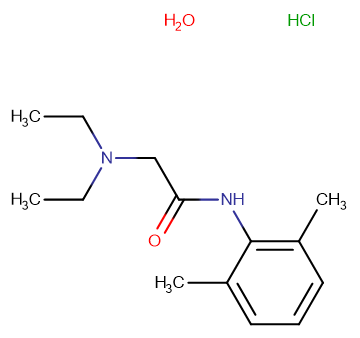
Lidocaine Hydrochloride hydrate
CAS No. 6108-05-0
Lidocaine Hydrochloride hydrate( —— )
Catalog No. M15297 CAS No. 6108-05-0
Lidocaine, an amide local anesthetic, has anti-inflammatory properties in vitro and in vivo.
Purity : >98% (HPLC)
 COA
COA
 Datasheet
Datasheet
 HNMR
HNMR
 HPLC
HPLC
 MSDS
MSDS
 Handing Instructions
Handing Instructions
| Size | Price / USD | Stock | Quantity |
| 50MG | 49 | In Stock |


|
| 100MG | 63 | In Stock |


|
| 200MG | 88 | In Stock |


|
| 500MG | Get Quote | In Stock |


|
| 1G | Get Quote | In Stock |


|
Biological Information
-
Product NameLidocaine Hydrochloride hydrate
-
NoteResearch use only, not for human use.
-
Brief DescriptionLidocaine, an amide local anesthetic, has anti-inflammatory properties in vitro and in vivo.
-
DescriptionLidocaine, an amide local anesthetic, has anti-inflammatory properties in vitro and in vivo, possibly due to an attenuation of pro-inflammatory cytokines, intracellular adhesion molecule-1 (ICAM-1), and reduction of neutrophils influx.(In Vitro):Lidocaine (Lignocaine) (10 nM; 48 hours) decreases significantly cell proliferation.Lidocaine (1-10 nM; 24-72 hours) inhibits cell viability and achieves the most suppressing effects at the concentration of 10?nM and treatment time 48?hours.Lidocaine (10 nM; 48 hours) increases significantly the apoptotic cell rate.Lidocaine (10 nM; 48 hours) down-regulates Cyclin D1 and up-regulates p21 expression significantly.(In Vivo):Lidocaine (Lignocaine) causes completely reversible tail nerve block in rats. Mechanical nociception block produced by lidocaine has slower onset and faster recovery compared with thermal nociception block.
-
In VitroLidocaine (Lignocaine) (10 nM; 48 hours) decreases significantly cell proliferation. Lidocaine (1-10 nM; 24-72 hours) inhibits cell viability and achieves the most suppressing effects at the concentration of 10?nM and treatment time 48?hours. Lidocaine (10 nM; 48 hours) increases significantly the apoptotic cell rate. Lidocaine (10 nM; 48 hours) down-regulates Cyclin D1 and up-regulates p21 expression significantly. Cell Proliferation Assay Cell Line:The human gastric cancer cell line MKN45 Concentration:10?nM Incubation Time:48 hours Result:Decreased significantly cell proliferation.Cell Viability Assay Cell Line:The human gastric cancer cell line MKN45 Concentration:1, 5 and 10?nMIncubation Time:24, 48, 72 hours Result:Inhibited MKN45 cell viability.Apoptosis Analysis Cell Line:The human gastric cancer cell line MKN45 Concentration:10?nM Incubation Time:48 hours Result:Increased significantly the apoptotic cell rate.Western Blot Analysis Cell Line:The human gastric cancer cell line MKN45 Concentration:10?nM Incubation Time:48 hours Result:Down-regulated Cyclin D1 and up-regulated p21 expression significantly.
-
In VivoLidocaine (Lignocaine) causes completely reversible tail nerve block in rats. Mechanical nociception block produced by lidocaine has slower onset and faster recovery compared with thermal nociception block.
-
Synonyms——
-
PathwayAngiogenesis
-
TargetEGFR
-
RecptorEGFR| Sodium Channel
-
Research AreaCardiovascular Disease
-
Indication——
Chemical Information
-
CAS Number6108-05-0
-
Formula Weight288.82
-
Molecular FormulaC14H22N2O·HCl·H2O
-
Purity>98% (HPLC)
-
SolubilityDMSO: 10 mM
-
SMILESO.Cl.CCN(CC)CC(=O)NC1=C(C)C=CC=C1C
-
Chemical Name——
Shipping & Storage Information
-
Storage(-20℃)
-
ShippingWith Ice Pack
-
Stability≥ 2 years
Reference
1.Sheets PL, et al. J Physiol. 2007 Jun 15;581(Pt 3):1019-3
molnova catalog



related products
-
AZD8931 diFuMaric ac...
AZD8931 is a reversible and ATP competitive inhibitor of EGFR, ErbB2 and ErbB3 (IC50 of 4 nM, 3 nM and 4 nM, respectively).AZD8931 significantly suppressed cell growth of IBC cells and induced apoptosis of human IBC cells in vitro.AZD8931 monotherapy inhibited xenograft growth.
-
NRC-2694
NRC-2694 is an antagonist of the epidermal growth factor receptor (EGFR). It has anti-cancer and anti-proliferative properties.
-
Tyrphostin A25
Tyrphostin A25 (Tyrphostin AG 82) is a specific EGFR tyrosine kinase inhibitor and GPR35 agonist with an IC50 value of 0.94 μM for GPR35 and an EC50 value of 5.3 μM for GPR35.



 Cart
Cart
 sales@molnova.com
sales@molnova.com


